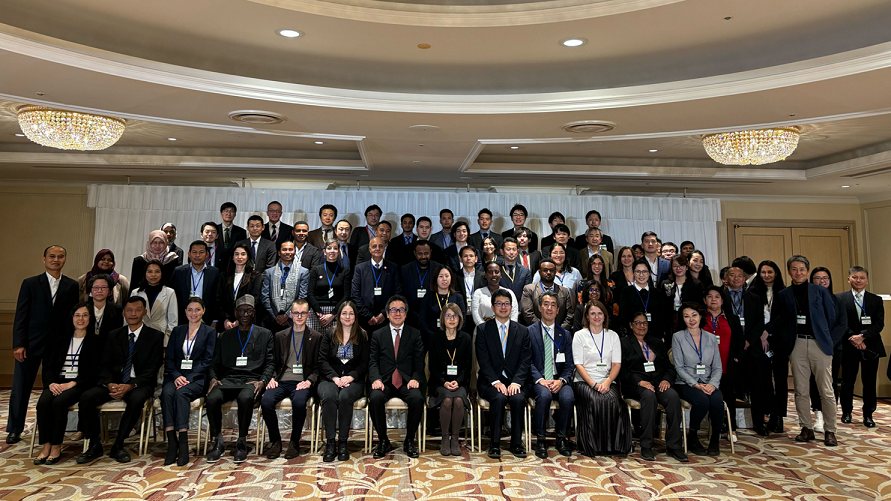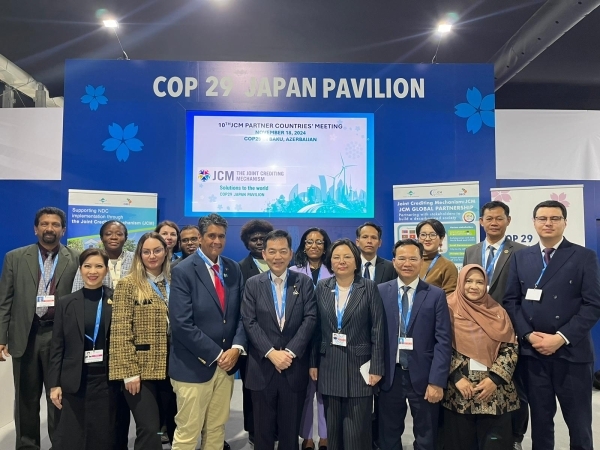Press Release
March 06, 2025
- Global Environment
Outcome of the 4th Meeting of Joint Crediting Mechanism (JCM) Global Partnership
1. The 4th Meeting of Joint Crediting Mechanism (JCM) Global Partnership was held on February 17-19, 2025.
2. Government officials and representatives from implementing organizations in 19 out of the 29 partner countries, along with delegates from relevant ministries and agencies, participated in the meeting. During the discussions, partner countries shared achievements of JCM and future possibilities. The meeting also focused on promoting project formulation, expansion of credit issuance, and improvement of efficiency of project implementation.
3. The Ministry of the Environment (MOE), Japan will continue to strive for completing the JCM system and framework, while also working to further expand and accelerate specific projects and to promote the implementation of Article 6 initiatives in countries around the world through the “Paris Agreement Article 6 Implementation Partnership.
1. Participants
Kingdom of Cambodia, Republic of Chile, Federal Democratic Republic of Ethiopia, Georgia, Republic of Indonesia, Lao People's Democratic Republic, Republic of Maldives, Republic of Moldova, Mongolia, Republic of Palau, Independent State of Papua New Guinea, Republic of the Philippines, Republic of Senegal, Democratic Socialist Republic of Sri Lanka, Kingdom of Thailand, Republic of Tunisia, Ukraine, Republic of Uzbekistan, Socialist Republic of Viet Nam, Japan (Ministry of the Environment, Ministry of Economy, Trade and Industry, Ministry of Agriculture, Forestry and Fisheries, Forestry Agency), Paris Agreement Article 6 Implementation Partnership (A6IP) Centre
2. Discussion summary
(1) Experience sharing
The experiences of various private sector investment projects and advanced concepts and support measures in the fields of renewable energy, agriculture and forestry, and carbon removal and absorption implemented in the Partner countries were shared and introduced by the Government of Japan, and the challenges and possibilities of project formulation were discussed.
As innovative decarbonization technologies, in particular, battery storage, waste-to-energy, floating solar, agrovoltaic, solar irrigation, methane emission reduction by alternate wetting and drying (ADW), afforestation/reforestation, CCS (carbon capture and storage), peatland conservation, waste management, green hydrogen production, etc., were introduced and discussed as areas of interest for the future among the participants, how climate action can align with economic and social benefits. Challenges such as the introduction of advanced technologies and high investment cost were also raised.
In order to promote private sector investment, the participating countries proposed that the formulation of JCM projects should be accelerated and expanded in scale, and that private-sector fund and government support would become increasingly important in promoting project formulation.
(2) Institutional development to accelerate Joint Crediting Mechanism (JCM) implementation
● Proposals for accelerating the implementation of Joint Crediting Mechanism (JCM) and revisions to rules and guidelines
There were proposals and introductions from JCM partner countries and the Ministry of the Environment of Japan on various case studies aimed at promoting JCM initiatives. Specifically, to promote JCM initiatives, the Government of Japan proposed to streamlining processes, improving efficiency in project cycles, and facilitating smoother implementation.
Additionally, the Japanese government explained its approach to JCM partner countries regarding the clear assessment and allocation of mitigation credits (as internationally transferred mitigation outcomes (ITMOs)) to be transferred from partner countries to Japan.
● Introduction of case studies to accelerate the implementation of the JCM in partner countries
JCM partner countries presented on the mutual recognition arrangements that have been signed to confirm that the JCM is an appropriate and sufficient system on a par with the carbon credit certification system of the relevant country, and that preparations are being made to transfer JCM credits to Japan, as well as on the case studies where a mechanism to implement the JCM under the domestic carbon credit system has been established.
● Authorization Procedure aligned with Article 6 of the Paris Agreement and Initial Report Submission
The Government of Japan also presented its proposal to JCM partner countries regarding the authorization procedures and preparation and submission of the Initial Report required under the Paris Agreement for the use of JCM credits as ITMOs in NDCs*. In particular, in order to promote the introduction of private sector investment, the Government of Japan emphasized the importance of authorization by each partner countries at the project registration stage and the early implementation of initial reports, etc., to ensure the stable use of ITMOs by private companies and sought the understanding of partner countries.
*NDC: Nationally Determined Contribution, the greenhouse gas emission reduction targets set by each country as required by the Paris Agreement.


3. 10th JCM Partner Country Meeting (Summary of results)
Prior to the Global Partnership Meeting (GPM), the 10th Joint Crediting Mechanism (JCM) Partner Country Meeting was held at the Japan Pavilion at the 29th Conference of the Parties to the United Nations Framework Convention on Climate Change (COP29), held in Baku, Azerbaijan last year.
The meeting was attended by ASAO Keiichiro, Minister of the Environment of Japan, and representatives from the 17 countries that have established the JCM. At the meeting, it was reaffirmed that, in collaboration with partner countries, more than 250 decarbonization projects have been formed to date, and that the JCM is steadily contributing to the reduction and absorption of greenhouse gases worldwide. In addition, participants expressed their expectations for future cooperation and the initiatives being taken in each country.
The Ministry of the Environment (MOE), Japan will continue to implement the JCM as a market mechanism in line with Article 6 of the Paris Agreement, and will contribute to global efforts to decarbonize by reducing and removing greenhouse gas emissions, helping partner countries achieve their NDCs, and contributing to sustainable development.
(1) Date and time: November 18, 2024, 17:30-18:00 (local time)
(2) Main attendees
Japan: ASAO Keiichiro, Minister of the Environment
Republic of Palau: Mr. Whipps, President
Mongolia: Ms. Odontuya, Minister of Environment and Climate Change
Republic of Moldova: Mr. Lazarencu, Minister of Environment
Republic of Kazakhstan: Mr. Oshurbaev, Deputy Minister of Ecology and Natural Resources
Republic of Kazakhstan: Mr. Oshurbaev, Deputy Minister of Ecology and Natural Resources
Ukraine: Ms. Yukhymchuk, Deputy Minister of Environmental Protection and Natural Resources
Republic of Maldives: Mr. Shareef, Special Envoy on Climate Change
Republic of Indonesia: Ms. Dhewanthi, Director General of Climate Change, Ministry of Environment and Forestry
Republic of Azerbaijan: Mr. Mutallimov, Head of the Department of Environmental Policy, Ministry of Ecology and Natural Resources
Democratic Socialist Republic of Sri Lanka: Mr. Jayathunga Assistant Secretary, Ministry of Environment
Kingdom of Thailand: Ms. Nitiphon, Acting Secretary General, Thailand Greenhouse Gas Management Organization
Socialist Republic of Viet Nam: Ms. Thanh, Deputy Director, Department of Climate Change, Ministry of Natural Resources and Environment
*In addition, the Federal Democratic Republic of Ethiopia, the Republic of Kenya, the Lao People's Democratic Republic, the Kingdom of Cambodia, the Independent State of Papua New Guinea, and the Kyrgyz Republic also participated.


4. Article 6 of the Paris Agreement and Joint Crediting Mechanism (JCM)
(1) The Paris Agreement requires Parties to prepare NDCs for the global response to climate change. Meanwhile, in order to effectively promote the reduction and removal of global greenhouse gases emission, Article 6 of the Paris Agreement stipulates a cooperative framework for reducing emissions and increasing removal through international cooperation, and for transferring the outcomes of such measures internationally. It is expected that the implementation of Article 6 of the Paris Agreement will promote the carbon market and private investment, and contribute to further mitigation in global greenhouse gas emissions as well as sustainable development.
・ The text of the Paris Agreement:
・ More information on Article 6:
(2) Japan has implemented an initiative called the Joint Crediting Mechanism (JCM), which is aligned with Article 6 of the Paris Agreement. The JCM is a mechanism in which Japanese companies and the Government of Japan cooperate with partner countries in the Global South and other areas in terms of technology and funding to implement measures, and the additional greenhouse gas (GHG) reduction and removal outcomes are evaluated in a quantitative manner in line with Article 6 of the Paris Agreement and shared between the partner country and Japan.
It is expected to contribute to the NDCs of both Japan and partner countries, and to revitalize the economies of both countries through the participation of private companies. Furthermore, it is also expected to contribute to sustainable development in partner countries by solving various social, economic and environmental issues.
Since the first JCM agreement was signed with Mongolia in 2013, JCM agreements have been established with 29 countries* to date, and more than 250 projects are currently underway.
*Mongolia, People's Republic of Bangladesh, Federal Democratic Republic of Ethiopia, Republic of Kenya, Republic of Maldives, Socialist Republic of Vietnam, Lao People's Democratic Republic, Republic of Indonesia, Republic of Costa Rica, Republic of Palau, Kingdom of Cambodia, United Mexican States, Kingdom of Saudi Arabia, Republic of Chile, Republic of the Union of Myanmar, Kingdom of Thailand, Republic of the Philippines, Republic of Senegal, Republic of Tunisia, Republic of Azerbaijan, Republic of Moldova, Georgia, the Democratic Socialist Republic of Sri Lanka, Republic of Uzbekistan, Independent State of Papua New Guinea, United Arab Emirates, Kyrgyz Republic, Republic of Kazakhstan, and Ukraine. In total 29 countries.
(3) About Paris Agreement Article 6 Implementation Partnership
The “Paris Agreement Article 6 Implementation Partnership” is a partnership launched by the Ministry of the Environment (MOE), Japan, in 2022 at COP27 to support capacity building related to Article 6 of the Paris Agreement. On the occasion of the G7 Ministers' Meeting on Climate, Energy and Environment in Sapporo in April 2023, the “Paris Agreement Article 6 Implementation Partnership Centre” was established at the Institute for Global Environmental Strategies (IGES) to serve as the secretariat to promote the activities of the partnership, and MOE Japan is providing operating funds. At present, 86 countries and over 200 organizations and companies have been participating in the partnership (as of the end of January 2025).
Contact information
Office of Director for International Cooperation for Transition to Decarbonization and Sustainable Infrastructure, Global Environmental Bureau, Ministry of the Environment, Japan
Phone:+81-3-5521-8246